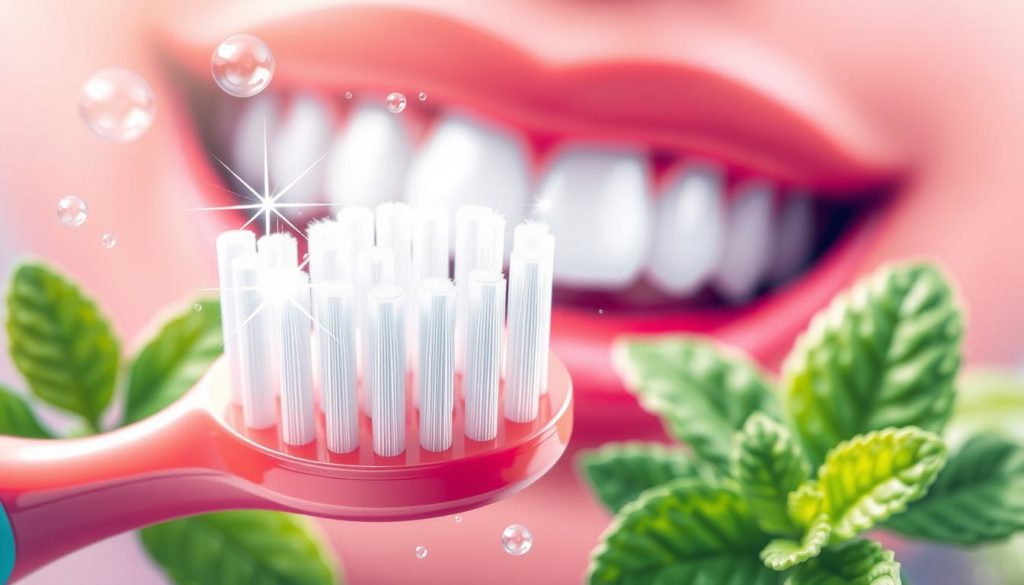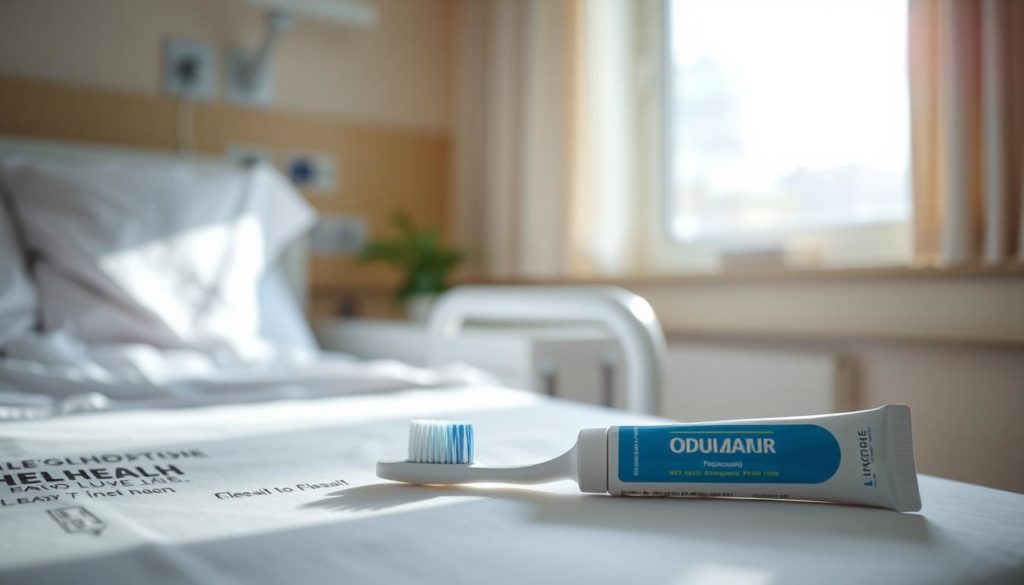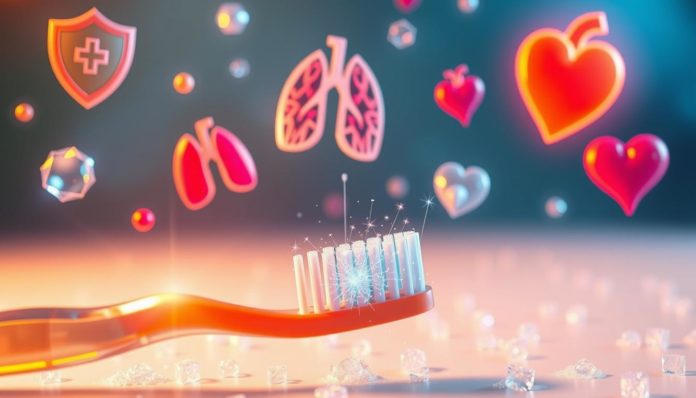Hospital-acquired pneumonia is a big problem for one in every 100 hospitalized people. Studies in JAMA Internal Medicine show that keeping your mouth clean reduces this risk. In fact, ICU patients who brushed twice daily had fewer pneumonia cases. They also spent less time in the ICU and faced lower death rates.
Keeping your mouth clean is key to stopping infections in the hospital. It’s a simple, cheap way to stay healthy compared to costly treatments.
The Connection Between Oral Hygiene and Pneumonia
Understanding the link between oral hygiene and our overall health is key. It is vital for preventing serious illnesses like pneumonia.
Understanding the Oral Microbiome
The oral microbiome is a complex ecosystem with about 700 types of microorganisms. Good oral hygiene keeps this microbiome balanced. It stops harmful bacteria from growing out of control.
Ignoring oral care can lead to dental plaques and gum disease. This can escalate into more serious health problems.
How Bacteria Travel to the Lungs
Poor oral hygiene can allow mouth bacteria to reach the lungs. This can lead to infections. It’s especially true for hospital-acquired pneumonia (HAP), where inhaled bacteria cause lung infections. This shows how oral health impacts lung health. Keeping your mouth clean helps control these harmful pathogens.

Impact of Toothbrushing on Hospital-Acquired Pneumonia
Brushing teeth is key in lowering the chance of hospital-acquired pneumonia. This is especially true for ICU patients on ventilators. A study in JAMA Internal Medicine showed that toothbrushing cuts down the risk of pneumonia and death in ICU. This action helps cut ICU stays short and lessens the need for ventilators.

Adding good brushing techniques to routine patient care leads to better health results. Regular toothbrushing removes bad bacteria. This improves oral health and lowers the risk of serious lung problems.
Importance of Dental Care for Respiratory Health
Dental care is vital for keeping the lungs healthy. Proper mouth care can greatly help people in critical care situations. This is especially true for those on machines to help them breathe.
Role of Toothbrushing in Reducing ICU Stays
Brushing teeth regularly in the ICU can make a big difference. It can mean patients leave sooner. Studies show that good dental habits help speed up recovery. This limits ICU time.
How? By cutting down mouth bacteria that could harm the lungs. This can lead to serious issues like ventilator-associated pneumonia (VAP). Brushing away these bacteria helps patients get off ventilators faster.
Mortality Rates and Mechanical Ventilation
Though vital, mechanical ventilation raises the risk of lung infections if oral care is missed. Better dental routines lead to lower death rates for these patients. Frequent toothbrushing reduces the danger of VAP, improving chances of survival.
Making sure patients follow strict mouth care rules is key. It’s crucial for keeping their lungs healthy and lowering death risks.
| Factor | Impact |
|---|---|
| Toothbrushing Frequency | Reduces ICU stays |
| Strict Dental Care | Lowers mortality rates |
| Mechanical Ventilation | Higher risk without proper oral hygiene |
| Respiratory Health | Improved with dental care |
Proper Brushing Techniques for Effective Bacteria Removal
Removing bacteria by brushing needs the right technique, timing, and tools. A regular oral health regimen boosts dental hygiene and overall health.
Frequency and Duration of Brushing
It’s advised to brush twice daily for at least two minutes. This helps keep your mouth free from harmful bacteria. Regular brushing reduces microbes and aids in bacteria removal.
Be sure to brush all teeth surfaces, including front, back, and tops. This keeps your oral health routine thorough.
Choosing the Right Toothbrush and Toothpaste
Choosing the right toothbrush is key for gum health. Soft-bristled brushes are often best. The toothpaste you use is just as important. Look for one with fluoride to help with bacteria removal and enamel strengthening.
Below is a comparison of different toothbrush types and their benefits:
| Toothbrush Type | Benefits |
|---|---|
| Soft-bristled | Gentle on gums, suitable for daily use |
| Medium-bristled | Effective for removing plaque and food residue |
| Electric Toothbrush | Superior at plaque removal, built-in timers |
Comparing Toothbrushing to Mouthwash for Pneumonia Prevention
In the fight against pneumonia, there’s a big discussion. Should we focus on thorough toothbrushing or using mouthwash? Mouthwashes with chlorhexidine are known for killing germs. But studies now show that brushing your teeth is also key in fighting mouth germs.
So, what’s better for preventing pneumonia? Toothbrushing or mouthwash? Considering the downsides of chlorhexidine mouthwash like taste changes and tooth stains, we must look if toothbrushing is a safer bet.
Brushing your teeth does more than just keep them clean. It scrubs away germs from your teeth and gums. This action might cut down the germs that can hurt your lungs, maybe even more than mouthwash.
| Method | Action | Advantages |
|---|---|---|
| Toothbrushing | Mechanical Removal of Plaque |
|
| Mouthwash | Antiseptic Properties |
|
Healthcare experts are looking closely at both methods. By combining brushing and mouthwash, we might get the best protection against pneumonia. The goal is top-notch mouth health and fewer lung infections.
Integrating Toothbrushing into Your Oral Health Routine
Making toothbrushing part of your daily oral health routine is key. It’s important to not only brush twice a day but also to include flossing and mouthwash. These steps are critical for preventing dental issues and even respiratory problems.
Daily Dental Care Tips
For a healthy mouth, follow these daily dental care tips. They help ensure good oral hygiene and support preventive care:
- Brush your teeth for at least two minutes, twice a day.
- Choose a toothbrush with soft bristles and replace it every three to four months.
- Use fluoride toothpaste to strengthen tooth enamel and prevent decay.
- Spit out the toothpaste but don’t rinse with water immediately to allow the fluoride to work longer.
Combining Brushing with Flossing and Mouthwash
To get the most from toothbrushing, add flossing and mouthwash to your care:
- Floss at least once daily to remove plaque and food particles from between teeth and under the gumline.
- Use an antimicrobial or fluoride mouthwash to kill bacteria and strengthen teeth.
- Rinse with mouthwash for around 30 seconds after brushing and flossing.
- Be consistent with these practices to effectively maintain an oral health routine that supports preventive dentistry.
Why Toothbrushing is Vital for Preventive Dentistry
Toothbrushing is crucial in preventing dental diseases, like periodontal diseases and even pneumonia. It stops dental plaque from building up. This lowers the chance of getting respiratory infections, showing how important oral care is for our health. Oral hygiene plays a big role in our overall.
Brushing your teeth regularly is key to good dental health and protecting against diseases like pneumonia. It’s vital to make toothbrushing part of your daily habit. Doing so greatly reduces the risk of respiratory problems.
”Consistently practicing proper toothbrushing techniques helps in significantly reducing the incidence of ventilator-associated pneumonia (VAP) on ICU patients, as shown by various studies.”
Using a mix of brushing and mouthwash, like chlorhexidine, is the best strategy. This combo is more effective than using them alone or with a placebo. Daily brushing is essential for a healthy mouth and lungs.
| Approach | Effectiveness |
|---|---|
| Tooth brushing + Chlorhexidine | High |
| Chlorhexidine Alone | Moderate |
| Tooth brushing + Placebo | Low |
Scientific Studies Supporting Toothbrushing and Pneumonia Prevention
Many scientific studies show toothbrushing lowers the risk of catching pneumonia in hospitals. This groundbreaking research includes clinical trials and studies about preventing pneumonia. They show how important toothbrushing is to keep pneumonia away.
Findings from Recent Meta-Analysis
A recent study in JAMA Internal Medicine looked at many clinical trials. It found that toothbrushing daily really helps reduce pneumonia risk in patients on ventilators. These patients also had a better chance of survival, thanks to good oral hygiene.
Clinical Trials and Research Data
Clinical trials have shown daily toothbrushing is key in fighting off pneumonia. These studies highlight how cleaning our teeth can protect us. This is true for both patients on ventilators and those who are not.
| Study | Sample Size | Outcomes |
|---|---|---|
| JAMA Internal Medicine Meta-Analysis | 15,000 | Decreased HAP in ventilated patients, lower mortality rates |
| Clinical Trial A | 2,500 | Reduced incidence of pneumonia, better overall respiratory health |
| Clinical Trial B | 1,200 | Improved outcomes with daily toothbrushing regimen |
Challenges and Misconceptions in Oral Hygiene Practices
Good oral health is key to overall health. Yet, many people don’t understand this. Oral hygiene challenges and misconceptions in dental care are common. They stem from not knowing enough and not having clear rules.
A big problem is hospitals not stressing toothbrushing enough. Since guidelines for prevention vary, practices differ. This leads to different results for patients.
It’s wrongly believed that toothbrushing isn’t vital for hospital patients. This view can weaken gum care efforts. Patients may then face serious risks like pneumonia.
Hospitals often lack consistent oral care standards. This oversight may miss the benefits of regular dental care. It makes it hard to boost patient health.
| Challenge | Impact |
|---|---|
| Inconsistent emphasis on toothbrushing | Varying patient outcomes |
| Misconceptions in dental care | Increased risk of complications |
| Lack of standardized protocols | Confused healthcare practices |
Adopting Effective Oral Health Habits in Everyday Life
Adopting good oral health habits does more than stop cavities; it has big health benefits. By brushing daily, you don’t only protect your teeth and gums. You’re also boosting your overall health.
It’s important to brush at least twice a day the right way with good toothpaste. This helps remove bacteria that could harm your lungs, causing infections.
Adding in floss and mouthwash to your brushing routine isn’t hard. These steps help cut down on bacteria. They keep your mouth clean and support your overall health. By sticking to these habits, you can fight off dental problems and illnesses like pneumonia.
FAQ
How does toothbrushing help in preventing pneumonia?
Brushing teeth cuts down harmful mouth bacteria. These bacteria can cause infections if they reach the lungs. Pneumonia, including HAP, can be avoided this way.
Why is oral hygiene particularly important for ICU patients?
ICU patients, especially on ventilators, face higher pneumonia risks. Good oral care, like brushing twice a day, reduces this risk. It also shortens ICU stays and saves lives.
What is the role of the oral microbiome in respiratory health?
The mouth is home to about 700 bacteria types. Good oral hygiene keeps these bacteria in check. This prevents lung problems such as pneumonia.
How often should hospital patients brush their teeth to prevent pneumonia?
Hospital patients should brush their teeth twice daily. This is especially crucial for those in the ICU. It’s the sweet spot for reducing pneumonia risk.
What brushing techniques are most effective for removing bacteria?
Brush for two minutes, twice daily, with the right toothbrush and toothpaste. This routine fights plaque and bacteria. It keeps your mouth clean and healthy.
Can mouthwash be used as a substitute for toothbrushing to prevent pneumonia?
No, brushing teeth is better than just using mouthwash. Studies show toothbrushing fights oral bacteria more effectively. Mouthwash alone isn’t enough.
What are some tips for maintaining a good oral health routine in hospitals?
To stay healthy in the hospital, brush teeth twice a day, floss, and use mouthwash as recommended. This complete care fights bacteria and prevents lung problems.
How does consistent toothbrushing contribute to preventive dentistry?
Regular brushing stops plaque buildup and gum disease, which can cause pneumonia. So, brushing is key for healthy teeth and lungs.
What evidence supports the role of toothbrushing in pneumonia prevention?
Research, including studies in JAMA Internal Medicine, links daily brushing to lower pneumonia rates in ventilated patients. It also connects to fewer deaths.
Are there challenges to implementing effective oral hygiene practices in hospitals?
Yes. Hospital oral care practices vary widely. This inconsistency and lack of focus can harm patient outcomes. More emphasis on oral hygiene is needed.
What are some effective oral health habits to adopt in everyday life?
Daily brushing, flossing, using mouthwash, and regular dentist visits are key. These habits keep your teeth healthy. They also protect against infections like pneumonia.


